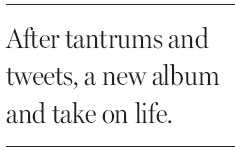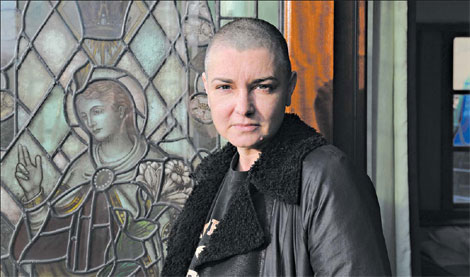For Sinead O'Connor, a fragile peacefulness
Updated: 2012-03-04 07:49
By Ravi Somaiya (The New York Times)
|
|||||||||||
|
The Irish singer Sinead O'Connor at home in Ireland after a tumultuous two decades. "I don't really think I have anything to apologize for," she said. [David Corio for The New York Times] |
COUNTY WICKLOW, Ireland - When Sinead O'Connor opened the door of her home recently, wearing a T-shirt that read "Property of Jesus" and a wool hat low over her blazing eyes, she sounded weary. "I'm very physically tired in a way that I've never been in my life," she said. "It's almost like my blood feels like lead."
The trouble began, the singer said, when she decided that after 20 years in the news - most memorably for tearing up a picture of the pope on live TV in 1992 to protest child abuse in the Catholic Church - she wouldn't let the world "stop me being me."
She took to her Web site last summer, looking for a man. She was so starved for sex, she wrote, that "inanimate objects are starting to look good." On December 8, her 45th birthday, she married a respondent, an Irish youth drug counselor named Barry Herridge, then 38, in Las Vegas, then tweeted and blogged every stage of the on-again-off-again relationship, fueling a barrage of snide headlines. (They are back together, she said, and firmly in love.)
Ordained a priest in an independent Catholic group in 1999, she came out as a lesbian in 2000, then changed her mind. Online she has been governed only by her whims, however dark. On January 11 she tweeted for help, seeking a psychiatrist. She had boarded a flight with pills in her bag, and tried to overdose, she said.
Even those who had mocked her excesses paused at the news.
Meanwhile, buzz was building. In November she performed music from her new album at a small concert in East London. A London Evening Standard reviewer described it as "spine-tingling." "Sinead O'Connor has seemed lost for some time," he wrote. Now, "she's found herself again."
The new album, "How About I Be Me (and You Be You)?," blends idealism and cynicism, love and loss. At its best, as on "Reason With Me," it matches the intensity of her acclaimed 1987 debut album, "The Lion and the Cobra."
"She's a very emotional person, and being an emotional person in this world is sometimes very difficult," said John Reynolds, her former husband and a longtime collaborator. "But it's why her music connects with people."
She is called crazy, she said, and it hurts. After the overdose incident, she admitted herself to a psychiatric facility. Now she is learning, she said, to accept that she is a good person. Over coffee, she is erudite, profane and confident, until she is not. At one point she asks if she is good or bad.

At home, amid children's toys and statues of Jesus (there's also a poster of the "Native American 10 Commandments" and a guitar bearing the Rastafarian flag), she is calm, focused on her young children, 5 and 8, and their half siblings, 16 and 24. Outside, she must reconcile, she said, her unfiltered impulsiveness with the needs of her family.
Still, she said, "I don't really think I have anything to apologize for." Judgment of her, she said, is tied to her gender: "No one asks Mick Jagger if he calmed down."
To some extent, she said, her life is still defined by brutal beatings as a child by her mother. "What I have is post-traumatic stress from that abuse," she said.
Her hit Prince song, "Nothing Compares 2 U," in 1990, made her a star and shaven-headed idol. Her album "I Do Not Want What I Haven't Got" that year sold millions. But then she announced a form of retirement, experimented with Irish folk and reggae, and learned bel canto. She returned to Ireland, after stints in London and Los Angeles, "so my children can be near their fathers," she said.
When she took to Twitter last year, she said, she had come to terms with who she was. "I want to be like any other person, but I'll have to accept that I can't be, because sometimes me being me hurts other people," she said. Her new Twitter account is locked, accessible only to those she knows.
"It's not fun anymore," she said. No one who judges her, she said in a text message, has "any inkling of the level of loneliness which would lead" to her missteps. But she vows now not to overshare online because, she wrote in a later message, she wants to be known only for two things she remains proud of: "making music and fighting the Vatican." Nothing more.
The New York Times
Today's Top News
Rescuers race against time for quake victims
Telecom workers restore links
Coal mine blast kills 18 in Jilin
Intl scholarship puts China on the map
More bird flu patients discharged
Gold loses sheen, but still a safe bet
US 'turns blind eye to human rights'
Telecom workers restore links
Hot Topics
Lunar probe , China growth forecasts, Emission rules get tougher, China seen through 'colored lens', International board,
Editor's Picks

|

|

|

|

|

|






